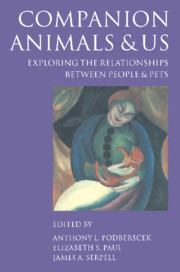Book contents
12 - Pets in the network of family relationships: an empirical study
from Part III - Pets, families and interactions
Summary
INTRODUCTION
In many western countries, approximately 50% of households contain pets (Marsh, 1994). This high level of pet ownership persists despite many potential costs. In addition to the financial costs of food, veterinary care and other pet products, disadvantages of pet ownership can include: time spent caring for the pet; restrictions on lifestyle; daily hassles resulting from caring for and cleaning up after pets; worry due to destructive or anti-social behaviour of pets; emotional distress, e.g. on the death of a pet; and risks such as bites, allergic reactions and other zoonoses (Plaut, Zimmerman & Goldstein, 1996). Given this long list of potential costs, and that relatively few pets are working animals ‘earning their keep’ in a practical way, owners presumably perceive substantial benefits from pets to persuade so many to keep them. Pets may have functional roles (Hirschman, 1994) such as impression management (e.g. dogs as fashion accessories, or acquisition of a fierce dog to fit a macho image), or avocation (the pet as a diversion or hobby, e.g. those kept for breeding or competing in shows). However, most accounts of positive aspects of pet ownership focus on pet ownership as a social relationship with advantages arising from relationship-based concepts such as support and attachment (Garrity et al., 1989), and protection against loneliness (Zasloff & Kidd, 1994). There may be other indirect benefits such as those which might result from the additional human contacts made as a result of pet ownership (Messent, 1983; McNicholas et al., 1993). Different types of benefit may combine within a single relationship, for example a pet that is kept for showing may also be valued for companionship, and because it fits the lifestyle image of a particular family. Within a family which shares one pet, each human family member may receive different types and degrees of benefits from the presence of the animal and incur different costs of pet ownership.
Research into pet ownership rarely looks simultaneously at the balance of benefits and disadvantages of pet ownership. Rather, journal articles often seek (and hence find) either positive or negative implications. Medical and veterinary publications tend to emphasize zoonoses, whereas journals in the social sciences tend to focus on positive aspects of human–pet relationships and benefits to health.
- Type
- Chapter
- Information
- Companion Animals and UsExploring the relationships between people and pets, pp. 209 - 236Publisher: Cambridge University PressPrint publication year: 2000



